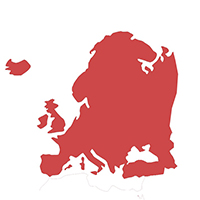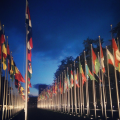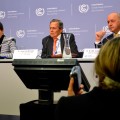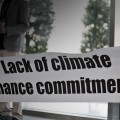Bonn June 2015: In Context
Laima Politajs | June 2, 2015.
With the Bonn climate change conference underway, The Verb looks at what happened in Geneva, why the next two weeks matter and what it means for Paris.
Merely six weeks out Lima, the February session of the UN climate change negotiations process (formally known as ADP 2.8) in Geneva, Switzerland “saw business as usual” according to WWF’s Samantha Smith. Not all negotiators would agree though, with many surprised at the amount of trust placed into the new co-chairs as a draft negotiation text, despite its hefty size, was produced before the week ended.
A pragmatic and efficient working process led to the adoption of an 86-page long ‘Geneva text‘ that still requires an ample amount of streamlining work, but reinforces renewed trust in the process. This streamlining work, which will involve considerable decision making, has been postponed until now, the June round of climate change negotiations.
Following Geneva, in March, developed countries were set a largely unkept deadline of submitting their intended nationally determined contributions (INDCs). Only ten countries have submitted their INDCs at present, with some also announcing national climate goals separate to their INDCs such as China’s promise to cap greenhouse gas emissions by 2030 or Japan’s reduction of 25% by 2030 (using 2013 as their base year).
The World Resources Institute have created a handy tool, an equity map, to help with comparing these submissions. Unfortunately, the task of comparing INDCs, let alone quantifying them, is no easy task with varying reference years for starters.
Outside of the UNFCCC bubble, there hasn’t been a shortage of climate related activities with the recent Petersberg Climate Dialogue and Climate Paris Week. Petersberg saw German Chancellor Angela Merkel announce ambitious targets in addition to her call for a clear roadmap on how the US$100 billion a year goal for the Green Climate Fund will be achieved. And Climate Paris Week saw companies such as Unilever join other major brands in committing to 100% renewable energy.
The flurry of similar activities continue with the upcoming G7 Summit, the release of the Pope’s encyclical on climate change and an ever-increasing surge of divestment campaigns locally. Civil society observers are hopeful that these events will inspire negotiators in addition to holding them accountable to the outside world.
In Bonn, negotiators have started to focus on resolving issues around the specifics of the Geneva text before Paris. This requires removing duplication and contradictions in the text, which when working with a consensus based approach is no easy feat. It’s unlikely that the next two weeks will go as smoothly as the Genevan session.
Editing by Linh Do. The Verb will be on the ground in Bonn to cover the UN climate change conference as it unfolds over 1-11 June 2015.













comment